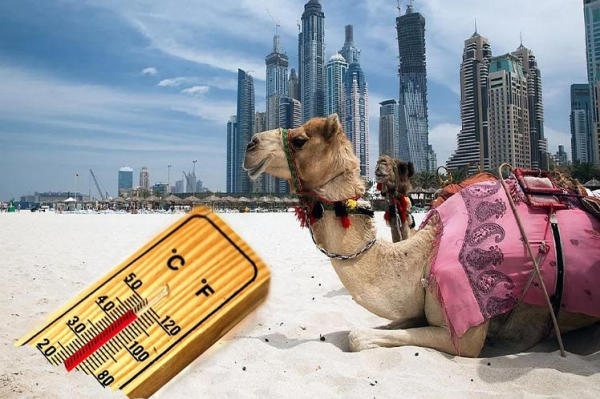UAE summer temperatures have officially reached their peak, with forecasts indicating the mercury could cross 50°C in some areas over the coming weeks. This extreme heat, paired with strong dry winds, marks one of the hottest spells the country has experienced in recent years.
What to expect during UAE summer temperatures peak
Summer in the UAE is known for being hot and intense, but this year, meteorologists warn it might be even more challenging. With UAE summer temperatures set to rise beyond 50°C, both residents and visitors need to be prepared for sweltering days and uncomfortable nights.
The National Center of Meteorology (NCM) recently announced that certain inland and desert areas will likely see temperatures consistently over 48°C, with some regions surpassing the 50°C mark. The combination of dry winds coming from the desert adds to the intensity, making the air feel even hotter and reducing humidity levels in coastal areas.

Why are UAE summer temperatures so extreme?
The UAE’s geography plays a big role in its weather patterns. The country lies within the arid desert climate zone, experiencing long, hot summers and short, mild winters. During summer, the region is affected by the so-called “Indian monsoon low” pressure system, which pushes hot air masses over the Arabian Peninsula.
Additionally, the lack of cloud cover means more direct sunlight reaches the ground, heating the land and urban structures rapidly throughout the day. At night, concrete and sand release the heat they absorbed, keeping temperatures high even after sunset.

The impact of dry winds on health and environment
Apart from soaring UAE summer temperatures, dry winds bring their own set of challenges. These winds, often carrying dust and sand, can significantly reduce air quality. They also increase the risk of dehydration and heat-related illnesses among residents.
Potential health risks include:
- Heat exhaustion and heat stroke
- Dehydration
- Respiratory problems due to dust and poor air quality
- Sunburns and skin irritation
Healthcare professionals advise staying indoors during peak afternoon hours, wearing light and loose-fitting clothing, and drinking plenty of fluids to stay hydrated. It is also recommended to avoid outdoor exercise or heavy activities during the hottest parts of the day.
How the UAE prepares for high summer temperatures
The UAE government and local authorities have long been aware of the annual summer challenges. Over the years, they have developed various strategies to help residents cope with extreme UAE summer temperatures.
Key measures include:
- Strict midday break rules for outdoor workers (usually from 12:30 pm to 3:00 pm)
- Public awareness campaigns on staying safe during heatwaves
- Enhanced emergency medical services to handle heat-related cases
- Regular monitoring of vulnerable groups, such as the elderly and children
- Cooling stations and shaded waiting areas at bus stops and public spaces
Companies are also encouraged to adjust work schedules and provide shaded resting places and adequate hydration for employees who work outdoors.
The role of urban planning in managing UAE summer temperatures

In recent years, urban planning and architectural design have played a major role in reducing the impact of extreme UAE summer temperatures on residents. Cities like Abu Dhabi and Dubai have introduced more green spaces, shaded walkways, and water features to mitigate heat.
Innovative solutions include:
- Green roofs and vertical gardens on buildings
- Reflective or lighter-colored building materials to reduce heat absorption
- Smart city initiatives using technology to monitor and manage heat
- Development of pedestrian-friendly areas with shaded pathways
These efforts not only improve comfort but also help reduce the “urban heat island” effect, where cities become significantly hotter than surrounding rural areas.
How residents can stay safe during UAE summer temperatures peak
During this peak period, it’s essential to take proactive measures to stay safe. Here are some practical tips for dealing with UAE summer temperatures:
Stay hydrated
Dehydration can happen quickly in extreme heat, especially when paired with dry winds. Make sure to:
- Drink at least 2-3 liters of water daily
- Avoid excessive caffeine and sugary drinks
- Eat fruits and vegetables with high water content, such as watermelon and cucumbers
Limit outdoor activities
Try to schedule outdoor tasks for early morning or late evening when temperatures are relatively lower. Avoid going out between 12 pm and 4 pm.
Dress appropriately
Wear light-colored, loose, and breathable clothing. Hats and sunglasses can protect against direct sun exposure, while sunscreen helps prevent sunburn.
Keep your home cool
- Close curtains and blinds during the day to block direct sunlight
- Use air conditioning wisely to maintain comfortable indoor temperatures
- Consider using fans to circulate air, but remember they don’t actually lower the temperature
Check on vulnerable individuals
Make sure elderly relatives, young children, and those with health conditions are safe and cool. Help neighbors or community members who may not have adequate cooling facilities.
The economic impact of soaring UAE summer temperatures
Extreme summer heat also affects various sectors of the UAE economy. Construction, agriculture, and outdoor service industries face challenges, with reduced working hours and increased health and safety measures.
Air conditioning and cooling systems become essential, driving up electricity demand significantly. In 2024, electricity consumption during peak summer days hit record highs, with similar or higher numbers expected this year.
Retail and hospitality sectors also adapt by focusing more on indoor experiences, offering summer promotions and indoor activities to attract customers.
How climate change might affect future UAE summer temperatures
Climate experts warn that rising global temperatures will likely make UAE summers even hotter in the coming decades. Climate change intensifies existing weather patterns, leading to longer heatwaves and higher peak temperatures.
The UAE has already begun working on long-term strategies to combat these effects, such as:
- Expanding renewable energy projects, especially solar power
- Investing in sustainable urban designs and cooling technologies
- Promoting water conservation and efficient resource use
Public education on climate change and sustainability has also become a priority, with schools and community groups taking part in awareness campaigns.
Upcoming weather forecast: What residents should know

According to the latest updates from the National Center of Meteorology, the UAE will continue to experience extremely high temperatures in the coming weeks. While some coastal areas may see slight relief in the evenings, inland and desert regions will remain very hot, with highs above 48°C and potential spikes to 50°C or beyond.
Dry winds are expected to persist, carrying dust and sand that can reduce visibility and air quality. Motorists are advised to drive cautiously, especially during dusty conditions.
What tourists and new residents should be aware of
For tourists visiting the UAE during summer, it is crucial to understand that sightseeing during midday hours is not advisable. Many indoor attractions, shopping malls, and cultural centers remain open and provide excellent alternatives.
New residents should quickly adapt to summer safety habits and understand local guidelines for heat protection. It’s important to follow government advisories and avoid taking risks during peak heat hours.
Community initiatives to help beat the heat
During summer, various community organizations and charities in the UAE run initiatives to support vulnerable groups. Examples include:
- Distributing free water and cooling kits to workers
- Setting up hydration stations in crowded areas
- Conducting workshops on heat safety and first aid for heat-related illnesses
These efforts reflect the UAE’s strong community spirit and collective responsibility to ensure everyone stays safe.
Looking ahead: Staying resilient amid UAE summer temperatures
While extreme UAE summer temperatures can be challenging, the country has shown remarkable resilience through technological advancements, policy initiatives, and strong community support. By working together and adopting safe practices, residents and visitors can navigate the hottest months more comfortably.
Whether you are a long-time resident, a new expatriate, or a summer tourist, it’s important to stay informed and take proactive steps to protect yourself and others. As temperatures continue to rise, awareness and preparedness remain the most effective defenses against the intense summer heat.
Follow us on instagram: UAE STORIES
Read More: Ras Al Khor Sanctuary Closure Sparks Major Dh650m Transformation












